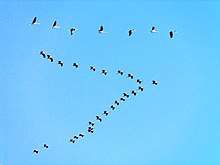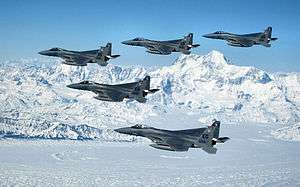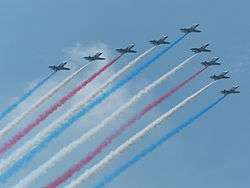V formation
A V formation is the symmetric V-shaped flight formation of flights of geese, swans, ducks, and other migratory birds, improving their energy efficiency. V formations also improve the fuel efficiency of aircraft and are used on military flight missions.

Aerodynamics
The V formation possibly improves the efficiency of flying birds, particularly over long migratory routes.[1] All the birds except the first fly in the upwash from one of the wingtip vortices of the bird ahead. The upwash assists each bird in supporting its own weight in flight, in the same way a glider can climb or maintain height indefinitely in rising air. According to a 1970 paper, in a V formation of 25 members, each bird can achieve a reduction of induced drag and as a result increase their range by 71%.[2] The birds flying at the tips and at the front are rotated in a timely cyclical fashion to spread flight fatigue equally among the flock members. Canada geese, ducks and swans commonly form a skein in V formation.[3]
Military flight missions

The "V", or "Vic" formation is a basic flight formation for military aircraft in many air forces. The Vic formation is also common in ceremonial flyovers and airshow flights.

Air Mobility Command, which accounts for 20 percent of all avionic fuel usage by the United States federal government, is experimenting with autopilot changes to find the best tradeoff between the reduced drag of 'vortex surfing' and the resulting 'ride qualities' of flying through another aircraft's wake.[4][5]
References
- USA Today: "Why birds fly in a V-formation" by Traci Watson January 15, 2014
- Lissaman, P.B.S. & Shollenberger, C.A. (1970). Formation flight of birds. Science 168(3934): 1003–1005 (same on JSTOR)
- "Oxford Dictionary: Skein". Retrieved 6 January 2019.
- Drinnon, Roger. "'Vortex surfing' could be revolutionary." Air Mobility Command, 10 October 2012.
- Warwick, Graham. "C-17 s Go Surfing, to Save Fuel." Aviation Week, 12 October 2012.
Bibliography
- Holmes, Tony. Spitfire vs Bf 109: Battle of Britain. Oxford, UK/ New York: Osprey, 2007. ISBN 1-84603-190-7.
External links
![]()